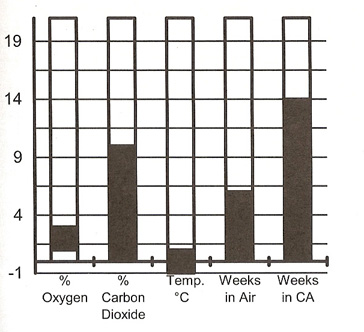
Optimum Relative Humidity: 90-95%
Benefits of CA: Low О2retards deterioration. Elevated CO2 reduces sensitivity to ethylene.
Benefits of Ethylene Removal: Carnations are among the most ethylene- sensitive commodities. Ethylene levels as low as 30-60 parts per billion can cause inrolling of carnation petals (called 'sleepiness') and shorten the postharvest life of the flowers. Carnations should never be kept in proximity to ethylene-producing commodities. Ethylene absorbers may be useful if flowers have not been treated with anti-ethylene chemicals such as silver thiosulfate.
Special Treatments Before Shipping: Carnations suitable for long- distance transportation are best harvested at the tight-bud stage. Carnations cut just after the petals have unfurled may be kept a maximum of 3- 4 weeks if kept dry and cold (-0.5 to 1.0°C). Flowers harvested at the tight-bud stage may be stored, in some cases, up to 12-14 weeks. Carnations are often pulsed with silver thiosulfate to reduce ethylene sensitivity and damage. They may be dipped in ipridione fungicide to reduce Botrytis decay. Flowers should be recut and conditioned in a preservative solution prior to marketing.
Varietal Differences: There are important differences among carnation varieties in their ethylene sensitivity, response to controlled atmospheres and postharvest life. Experimental treatmetns using СО2up to 60% for one week have not caused damage to carnations. Shipping conditions should be guided by experience with the variety.
Mixed Loads: Do not ship with ethylene producing commodities.
Cautions : Low О2may cause leaf discoloration. Studies of the use of CA with carnations have yielded mixed results depending on conditions and variety tested. Unless CA for a given variety has been evaluated and shown to be beneficial, CA is not recommended.
ООО «Транстек» - Рефконтейнеры.рф ®

